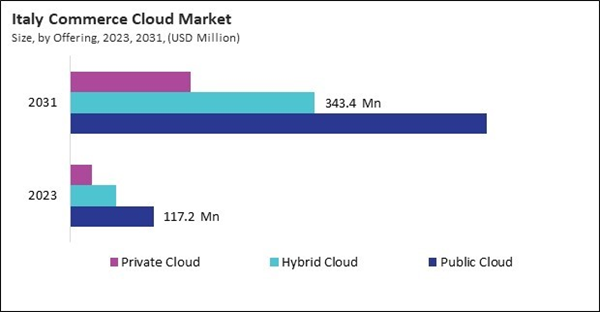The Germany market dominated the Europe Commerce Cloud Market by Country in 2023, and would continue to be a dominant market till 2031; thereby, achieving a market value of $5.58 billion by 2031. The UK market is exhibiting a CAGR of 21.1% during (2024 - 2031). Additionally, The France market would experience a CAGR of 23% during (2024 - 2031).
Commerce cloud platforms support advanced product visualization techniques such as 3D models and interactive product views. Customers can explore products from all angles, zoom in on details, and see how products fit into real-world environments through augmented reality (AR). Especially useful for fashion and beauty industries, virtual try-on features allow customers to see how clothing, accessories, or makeup will look on them using AR technology, reducing the likelihood of returns and increasing customer satisfaction.
Furthermore, commerce cloud solutions use predictive analytics to forecast demand and automate inventory replenishment. This ensures that businesses maintain optimal stock levels, reducing the risk of stockouts or overstocking. Businesses have the option to implement VMI strategies, which involve suppliers managing inventory levels in accordance with real-time sales data and predetermined thresholds. This approach helps to optimize the supply chain.
With a growing focus on sustainability in Europe, electronics retailers are seeking commerce cloud solutions that offer features for tracking and reporting environmental impacts, such as carbon footprints and recycling programs. The increased sales of electronics products drive the need for Commerce Cloud platforms that can scale to handle high traffic and large transaction volumes during peak periods such as Black Friday and the holiday seasons. Commerce cloud solutions are evolving to include automated inventory management and order fulfillment features, ensuring real-time tracking of electronic stock levels, efficient restocking, and streamlined order processing. Therefore, rising electronics sales in the region drive the market's growth.
Based on Type, the market is segmented into Platform, and Services. Based on Offering, the market is segmented into Public Cloud, Hybrid Cloud, and Private Cloud. Based on Enterprise Size, the market is segmented into Large Enterprises, and SMEs. Based on Vertical, the market is segmented into Fashion & Apparel, Electronics & Appliances, Food & Beverages, Pharmaceutical & Grocery, and Other Vertical. Based on countries, the market is segmented into Germany, UK, France, Russia, Spain, Italy, and Rest of Europe.
List of Key Companies Profiled
- Oracle Corporation
- com, Inc.
- IBM Corporation
- Microsoft Corporation
- SAP SE
- Shopify Inc.
- Amazon Web Services, Inc. (Amazon.com, Inc.)
- Adobe, Inc.
- Google LLC
- BigCommerce Inc.
Market Report Segmentation
By Type
- Platform
- Services
By Offering
- Public Cloud
- Hybrid Cloud
- Private Cloud
By Enterprise Size
- Large Enterprises
- SMEs
By Vertical
- Fashion & Apparel
- Electronics & Appliances
- Food & Beverages
- Pharmaceutical & Grocery
- Other Vertical
By Country
- Germany
- UK
- France
- Russia
- Spain
- Italy
- Rest of Europe
Table of Contents
Companies Mentioned
- Oracle Corporation
- Salesforce.com, Inc.
- IBM Corporation
- Microsoft Corporation
- SAP SE
- Shopify Inc.
- Amazon Web Services, Inc. (Amazon.com, Inc.)
- Adobe, Inc.
- Google LLC
- BigCommerce Inc.









